Charles E W Bean, Diaries, AWM38 3DRL 606/251/1 - 1915 - 1936 - Part 20
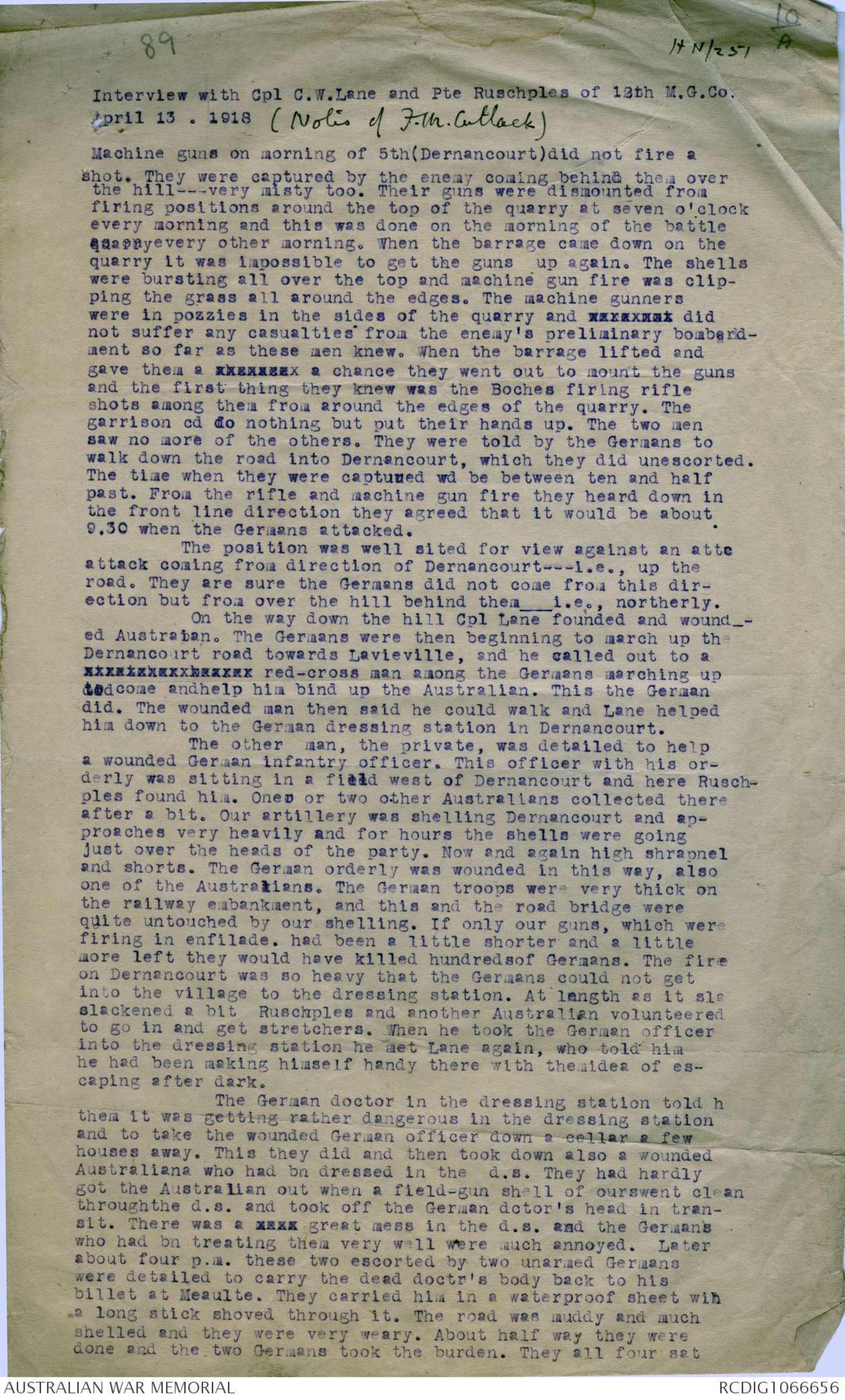
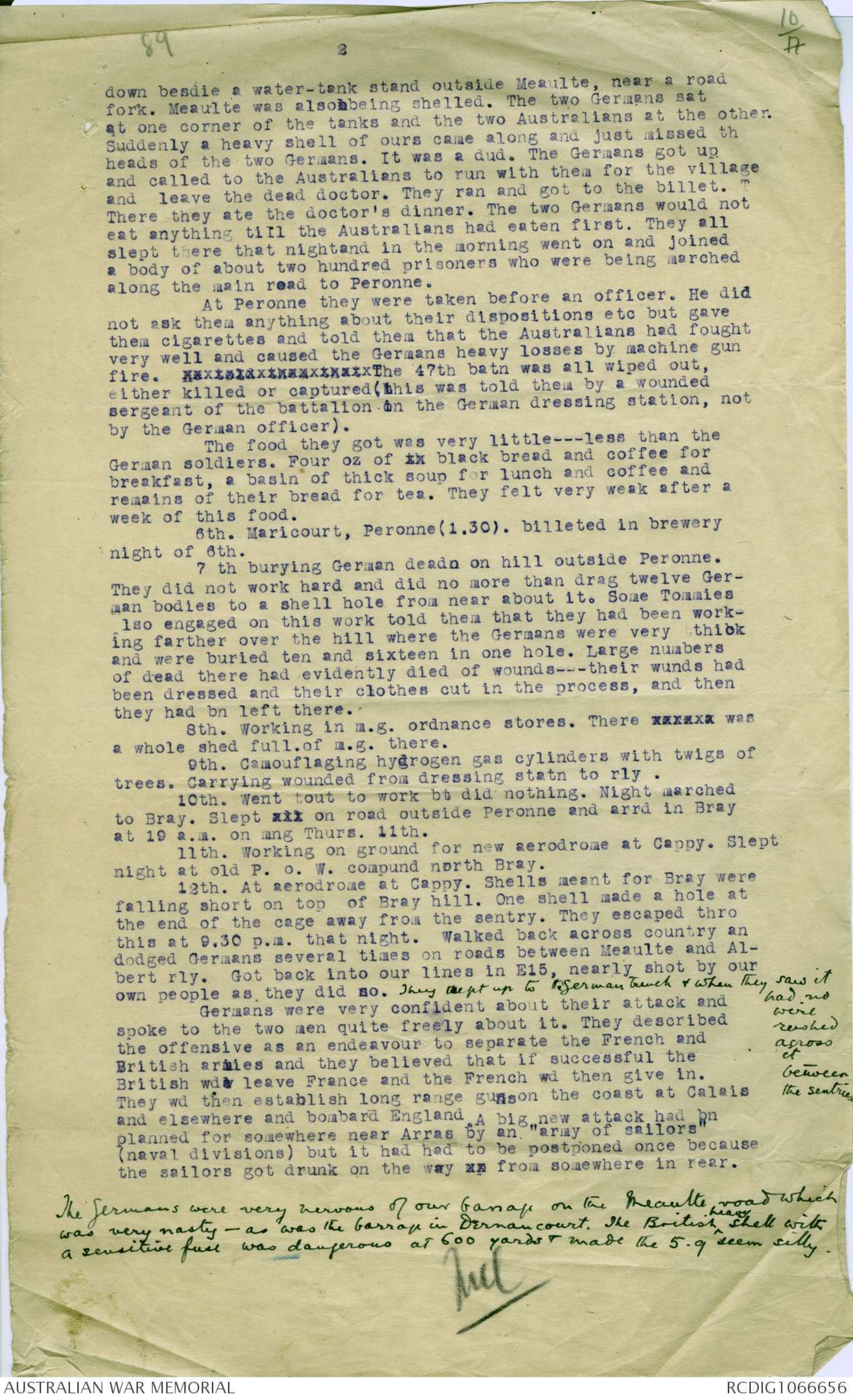
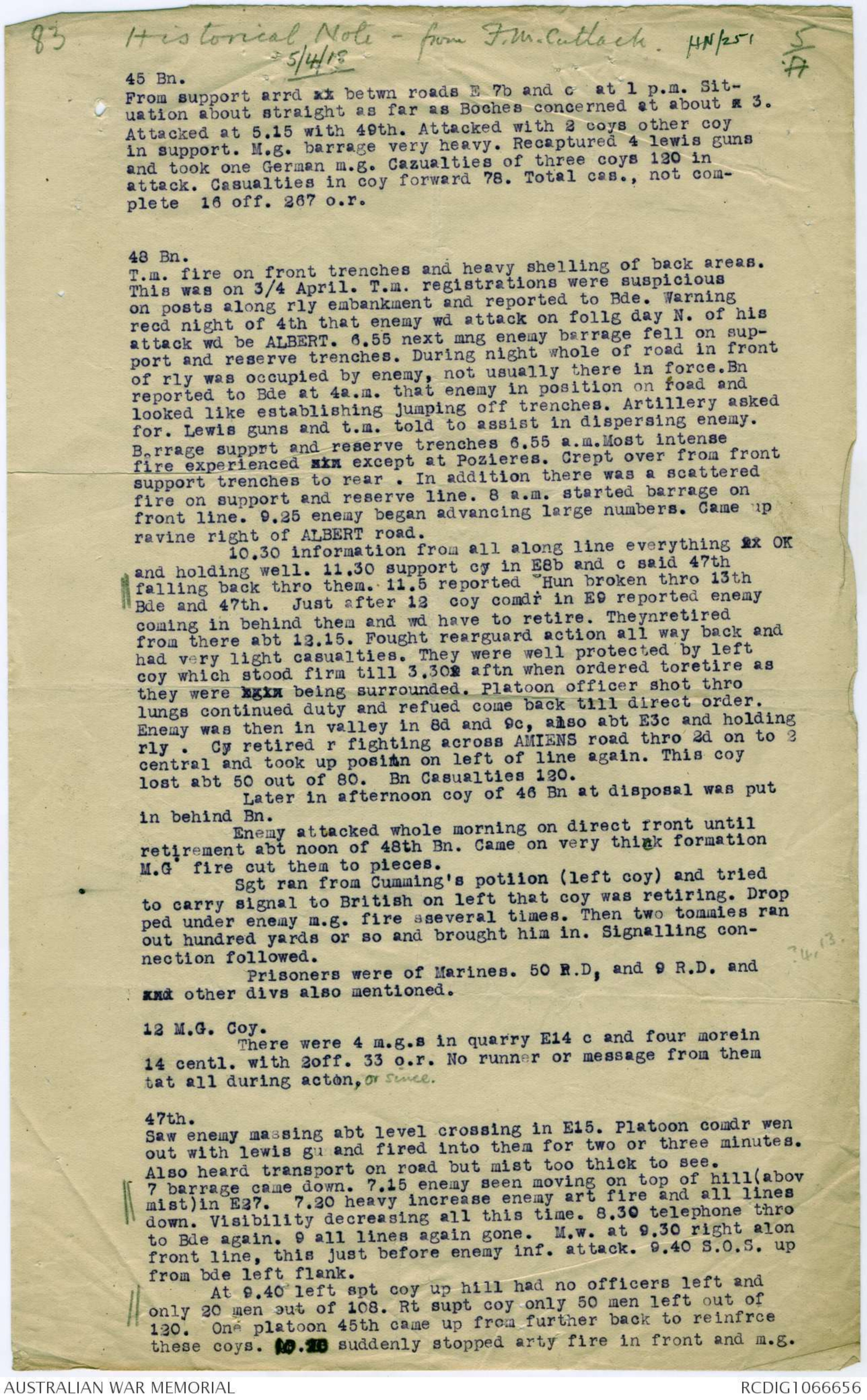
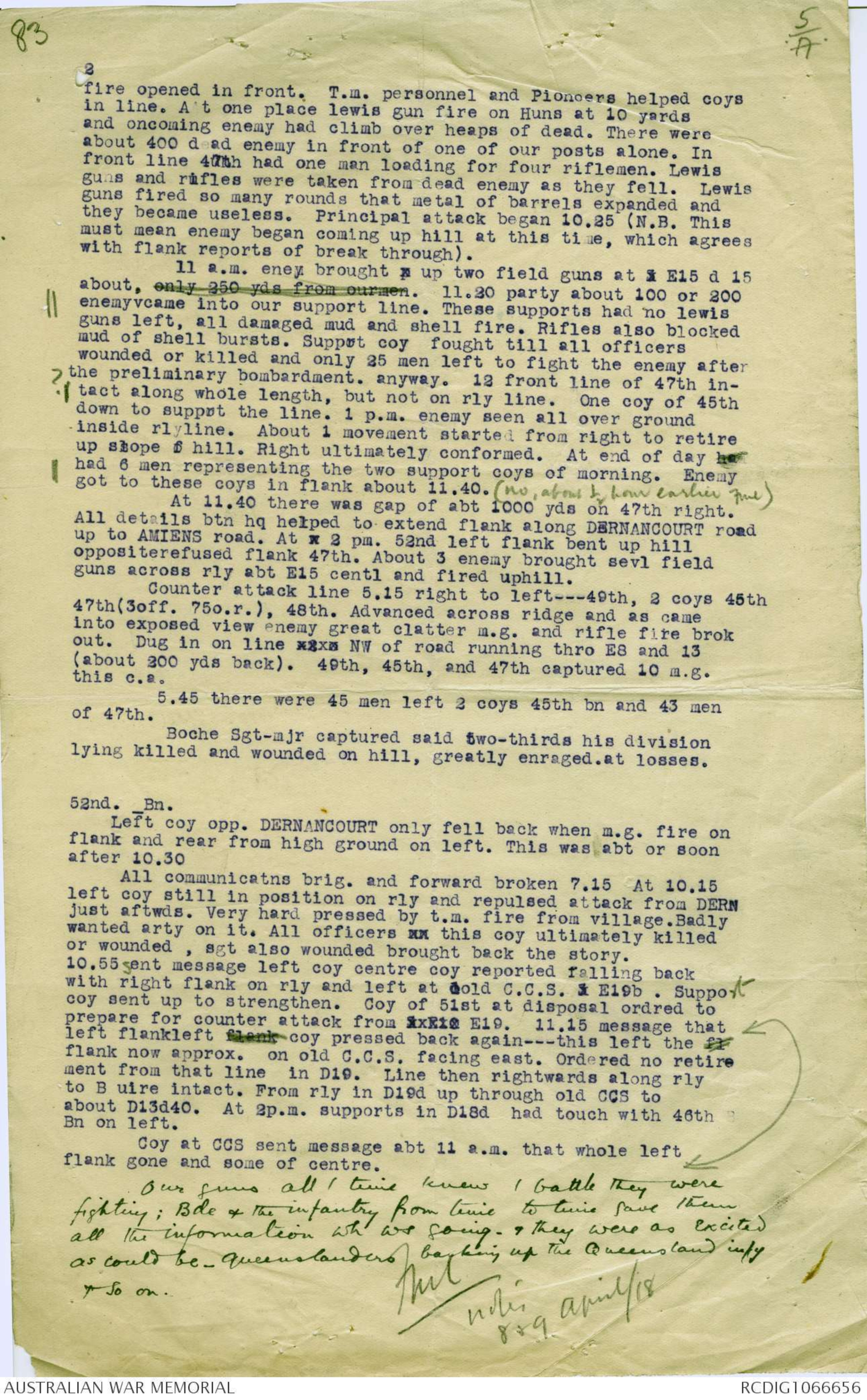
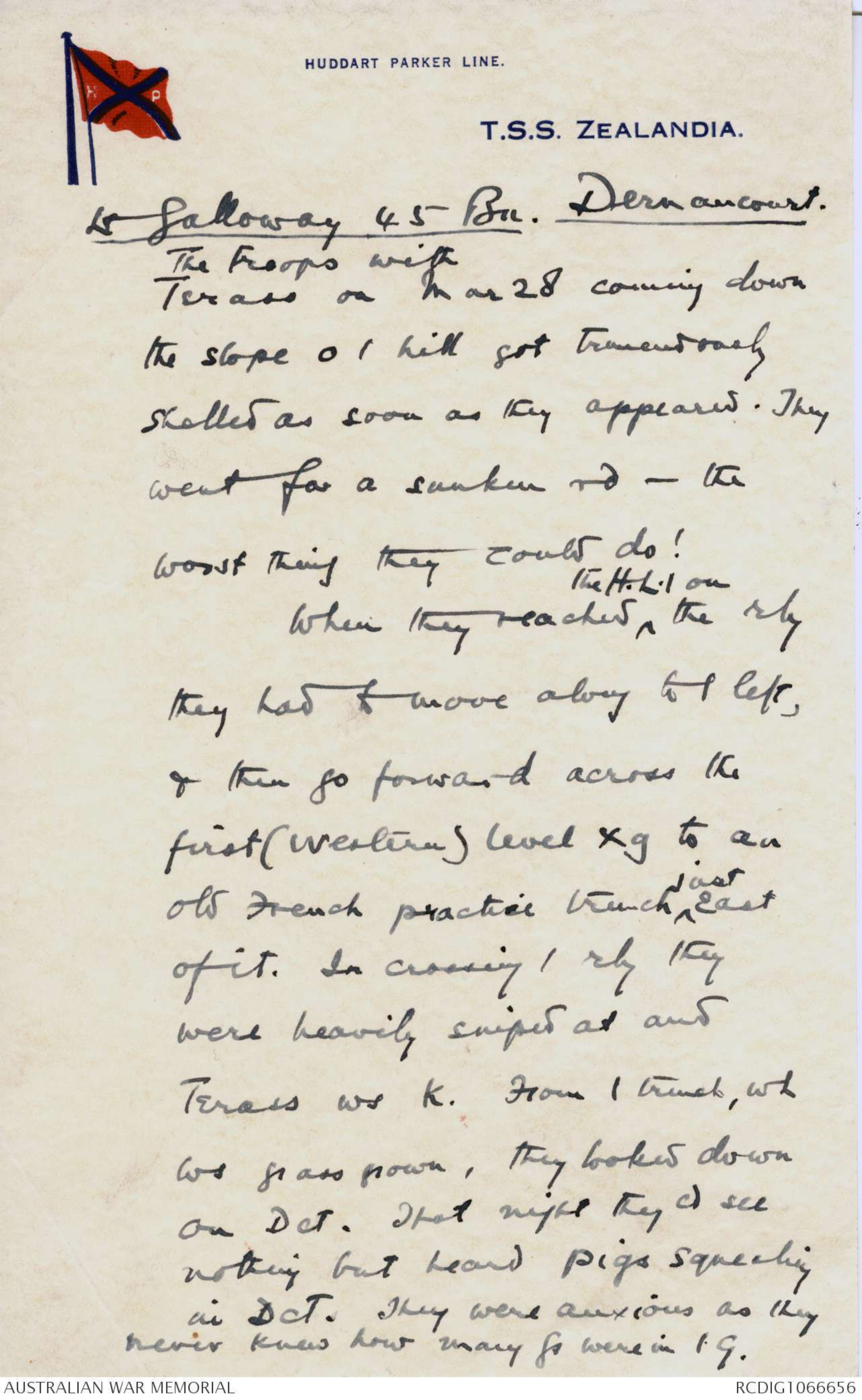
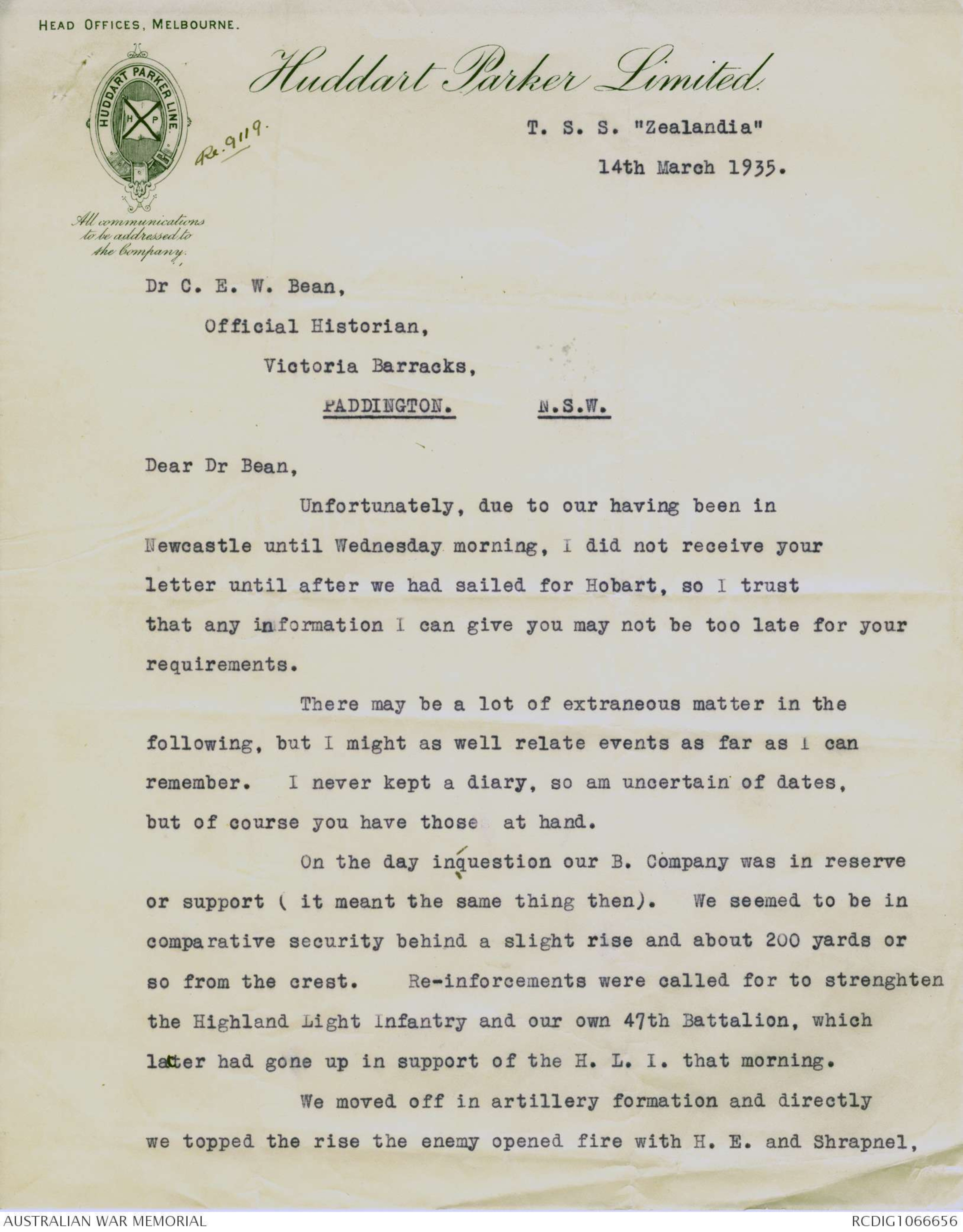
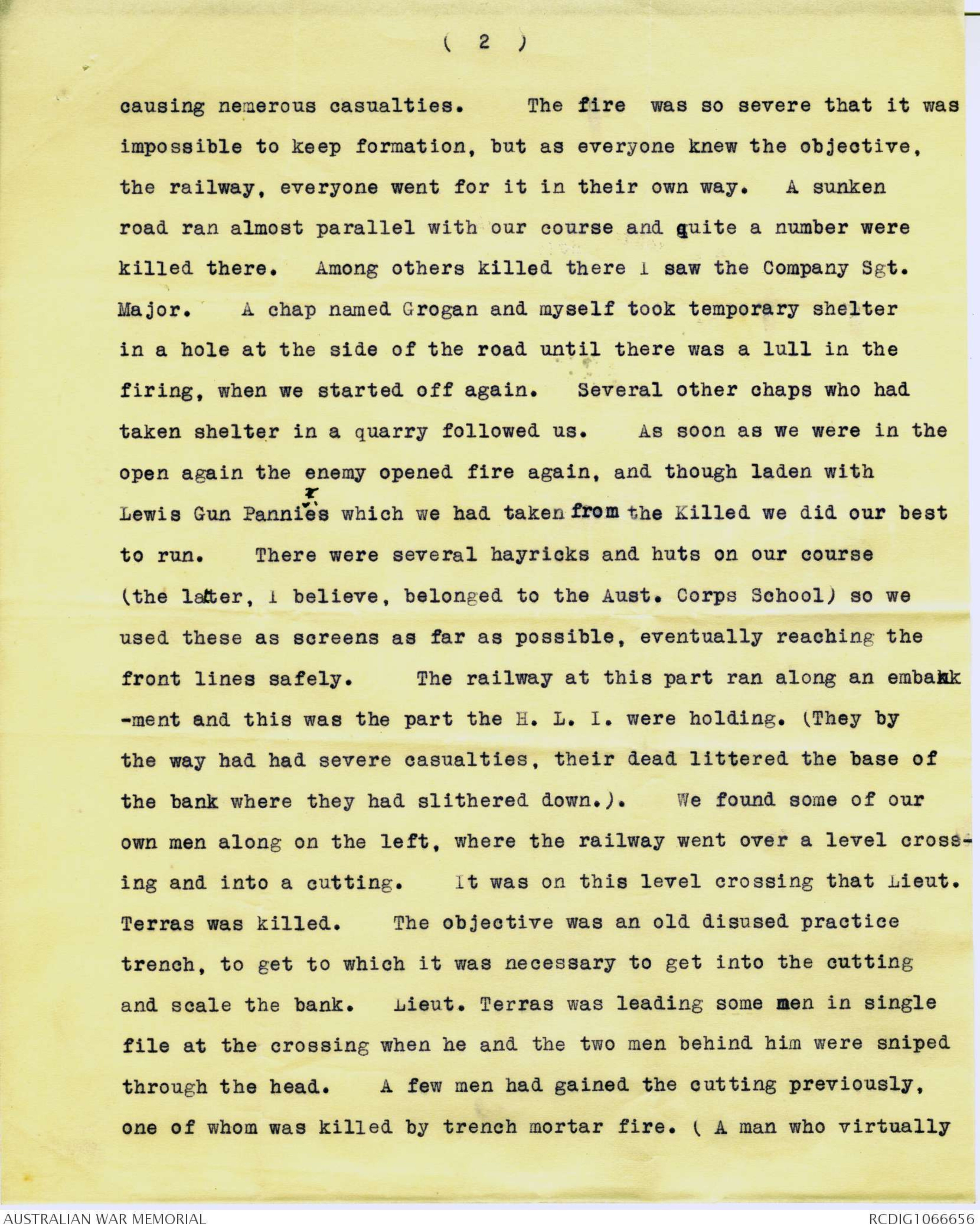
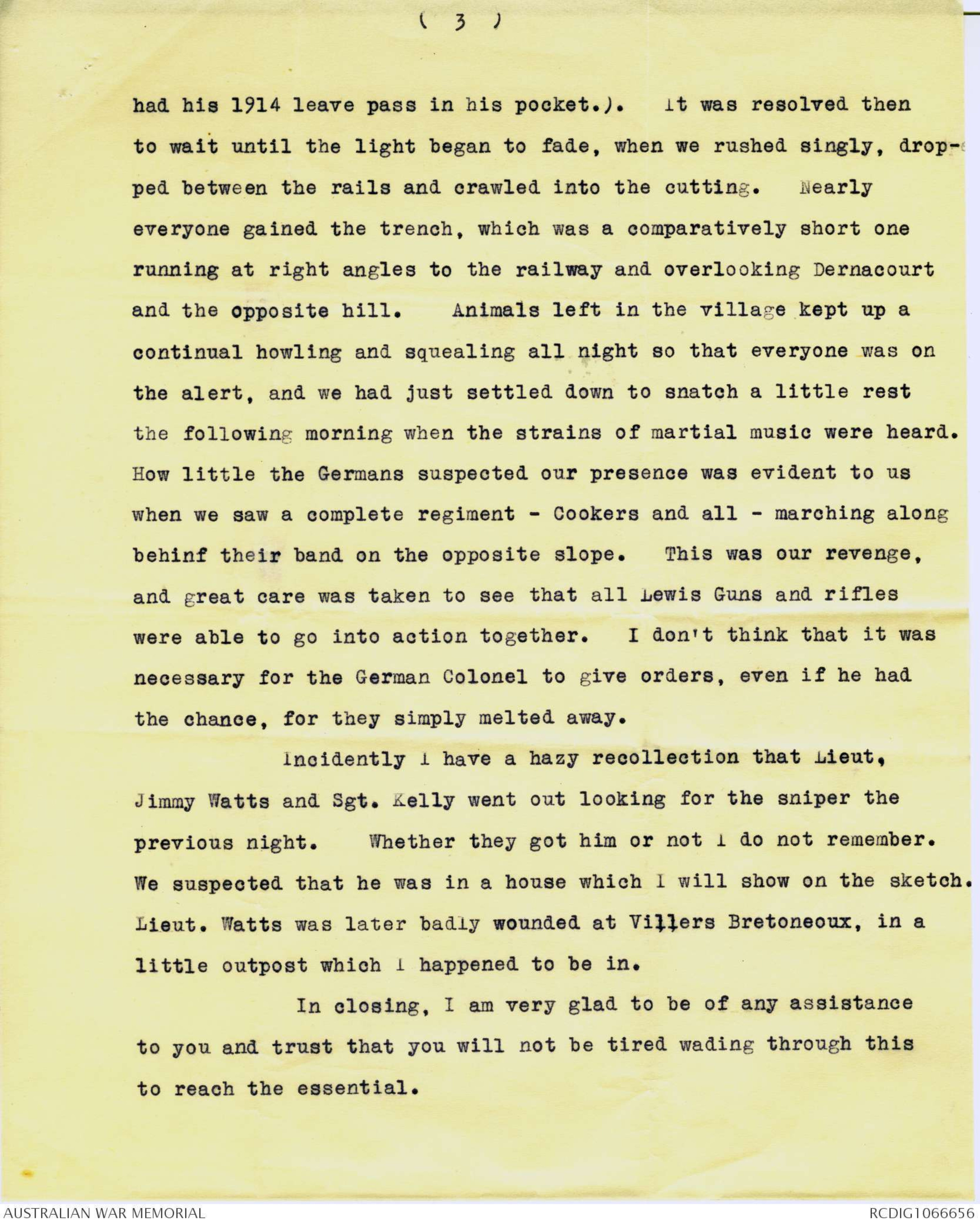
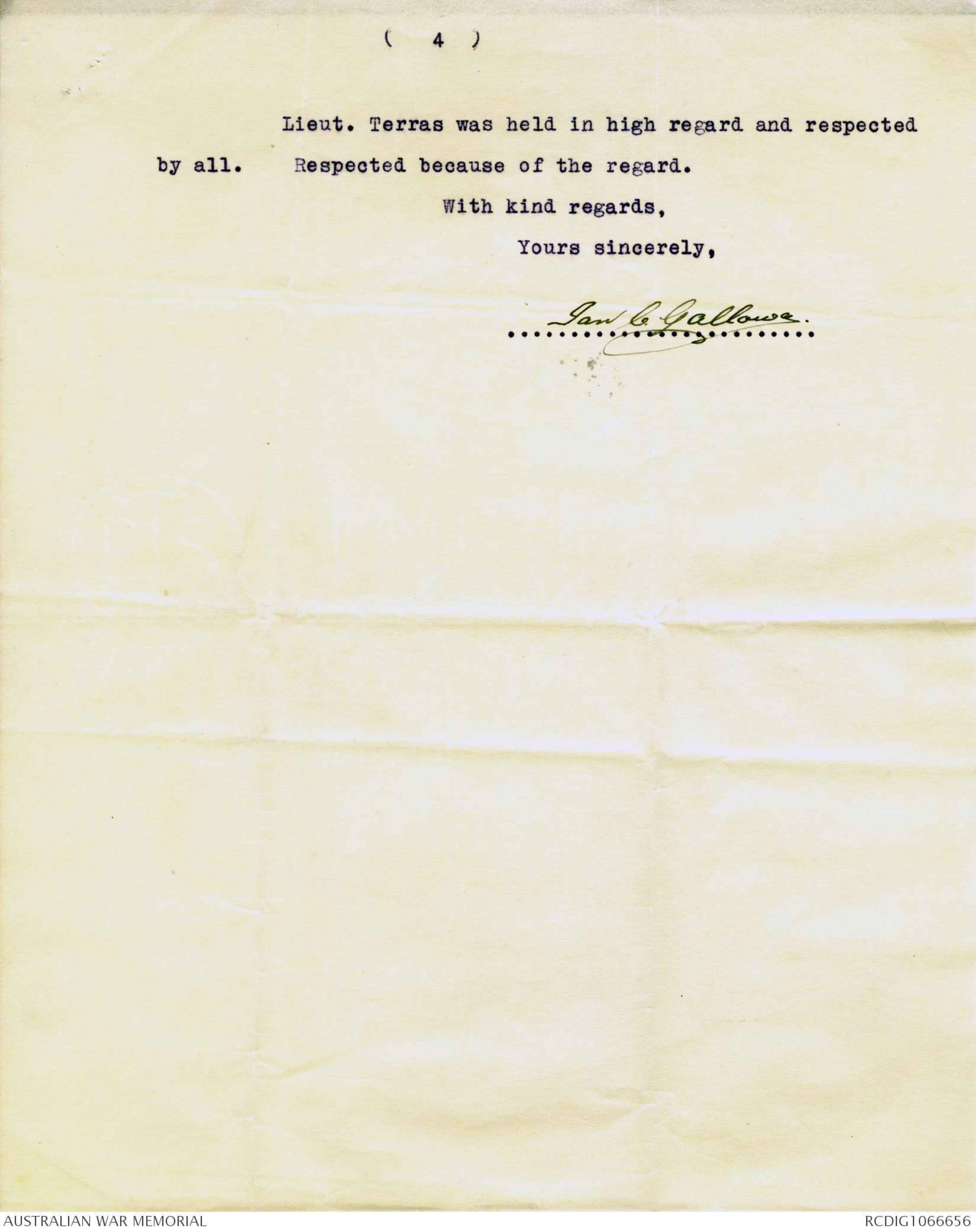
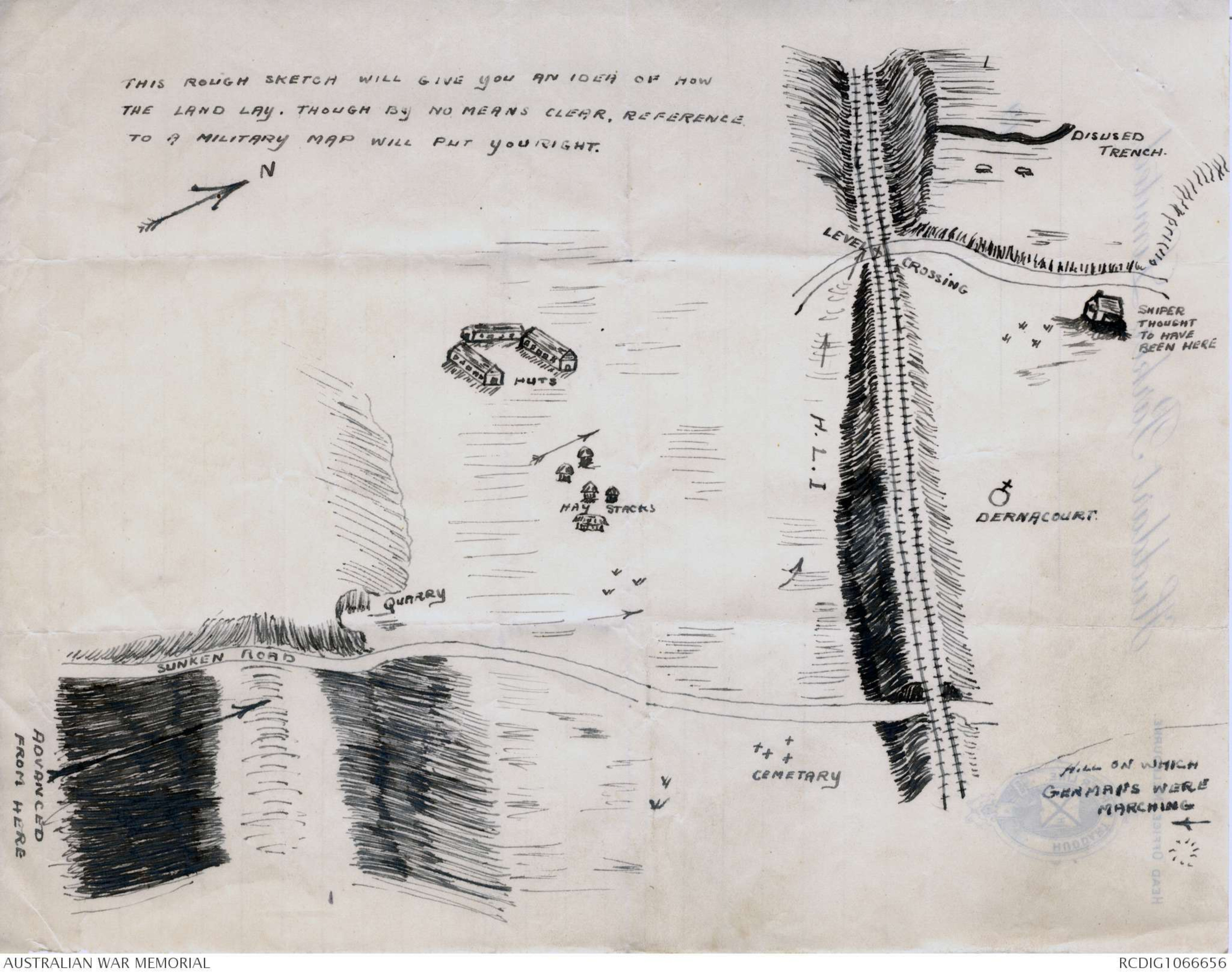
89 10
HN/251 A
Interview with Cpl C.W. Lane and Pte Ruschples of 12th M.G. Co.
April 13. 1918 (Notes of F.M. Cutlack)
Machine guns on morning of 5th(Dernancourt) did not fire a
shot. They were captured by the enemy coming behind them over
the hill---very misty too. Their guns were dismounted from
firing positions around the top of the quarry at seven o'clock
every morning and this was done on the morning of the battlequarry every other morning. When the barrage came down on the
quarry it was impossible to get the guns up again. The shells
were bursting all over the top and machine gun fire was clipping
the grass all around the edges. The machine gunners
were in pozzies in the sides of the quarry and were not did
not suffer any casualties from the enemy's preliminary bombardment
so far as these men knew. When the barrage lifted and
gave them a xxxxxxxx a chance they went out to mount the guns
and the first thing they knew was the Boches firing rifle
shots among them from around the edges of the quarry. The
garrison cd do nothing but put their hands up. The two men
saw no more of the others. They were told by the Germans to
walk down the road into Dernancourt, which they did unescorted.
The time when they were captured wd be between ten and half
past. From the rifle and machine gun fire they heard down in
the front line direction they agreed that it would be about
9.30 when the Germans attacked.
The position was well sited for view against an attc
attack coming from direction of Dernancourt---i.e., up the
road. They are sure the Germans did not come from this direction
but from over the hill behind them i.e., northerly.
On the way down the hill Cpl Lane founded and wounded
Austraian. The Germans were then beginning to march up the
Dernancourt road towards Lavieville, and he called out to astretcher bearer red-cross man among the Germans marching up
tod come andhelp him bind up the Australian. This the German
did. The wounded man then said he could walk and Lane helped
him down to the German dressing station in Dernancourt.
The other man, the private, was detailed to help
a wounded German infantry officer. This officer with his orderly
was sitting in a field west of Dernancourt and here Ruschples
found him. Oner or two other Australians collected there
after a bit. Our artillery was shelling Dernancourt and ap-
proaches very heavily and for hours the shells were going
just over the heads of the party. Now and again high shrapnel
and shorts. The German orderly was wounded in this way, also
one of the Australians. The German troops were very thick on
the railway embankment, and this and the road bridge were
quite untouched by our shelling. If only our guns, which were
firing in enfilade. had been a little shorter and a little
more left they would have killed hundredsof Germans. The fire
on Dernancourt was so heavy that the Germans could not get
into the village to the dressing station. At length as it sla
slackened a bit Ruschples and another Australian volunteered
to go in and get stretchers. When he took the German officer
into the dressing station he met Lane again, who told him
he had been making himself handy there with themidea of
escaping after dark.
The German doctor in the dressing station told h
them it was getting rather dangerous in the dressing station
and to take the wounded German officer down a cellar a few
houses away. This they did and then took down also a wounded
Australiana who had bn dressed in the d.s. They had hardly
got the Australian out when a field-gun shell of ourswent clean
through the d.s. and took off the German dctor's head in tran-
sit.There was a xxxx great mess in the d.s. and the Germans
who had bn treating them very well were much annoyed. Later
about four p.m. these two escorted by two unarmed Germans
were detailed to carry the dead doctr's body back to his
billet at Meaulte. They carried him in a waterproof sheet wih
a long stick shoved through it. The road was muddy and much
shelled and they were very weary. About half way they were
done and the two Germans took the burden. They all four sat
89 2 10/17
down besdie a water-tank stand outside Meaulte, near a road
fork. Meaulte was alsohbeing shelled. The two Germans sat
at one corner of the tanks and the two Australians at the other.
Suddenly a heavy shell of ours came along and just missed th
heads of the two Germans. It was a dud. The Germans got up
and called to the Australians to run with them for the village
and leave the dead doctor. They ran and got to the billet. T
There they ate the doctor's dinner. The two Germans would not
eat anything till the Australians had eaten first. They all
slept there that nightand in the morning went on and joined
a body of about two hundred prisoners who were being marched
along the main road to Peronne.
At Peronne they were taken before an officer. He did
not ask them anything about their dispositions etc but gave
them cigarettes and told them that the Australians had fought
very well and caused the Germans heavy losses by machine gun
fire. He told them thatx The 47th batn was all wiped out,
either killed or captured (this was told them by a wounded
sergeant of the battalion in the German dressing station, not
by the German officer).
The food they got was very little––-less than the
German soldiers. Four oz of th black bread and coffee for
breakfast, a basin of thick soup for lunch and coffee and
remains of their bread for tea. They felt very weak after a
week of this food.
6th. Maricourt, Peronne (1.30). billeted in brewery
night of 6th.
7th burying German deado on hill outside Peronne.
They did not work hard and did no more than drag twelve Ger-
man bodies to a shell hole from near about it. Some Tommies
also engaged on this work told them that they had been work-
ing farther over the hill where the Germans were very thick
and were buried ten and sixteen in one hole. Large numbers
of dead there had evidently died of wounds–--their wunds had
been dressed and their clothes cut in the process, and then
they had bn left there.
8th. Working in m.g. ordnance stores. There were a was
a whole shed full.of m.g. there.
9th. Camouflaging hydrogen gas cylinders with twigs of
trees. Carrying wounded from dressing statn to rly.
l0th. Went tout to work bt did nothing. Night marched
to Bray. Slept all on road outside Peronne and arrd in Bray
at 10 a.m. on mng Thurs. 11th.
11th. Working on ground for new aerodrome at Cappy. Slept
night at old P. o. W. compund north Bray.
12th. At aerodrome at Cappy. Shells meant for Bray were
falling short on top of Bray hill. One shell made a hole at
the end of the cage away from the sentry. They escaped thro
this at 9.30 p.m. that night. Walked back across country an
dodged Germans several times on roads between Meaulte and Al-
bert rly. Got back into our lines in E15, nearly shot by our
own people as they did so.
[*They crept up to the German Trench & when they saw it
had no
wire
rushed
across
it -
between
the sentries*]
Germans were very confident about their attack and
spoke to the two men quite freely about it. They described
the offensive as an endeavour to separate the French and
British armies and they believed that if successful the
British wdx leave France and the French wd then give in.
They wd then establish long range gunson the coast at Calais
and elsewhere and bombard England. A big new attack had bn
planned for somewhere near Arras by an "army of sailors"
(naval divisions) but it had had to be postponed once because
the sailors got drunk on the way xx from somewhere in rear.
[*The Germans were very nervous of our barrage on the Meaulte road which
was very nasty - as was the barrage in Dernancourt. The British ^heavy shell with
a sensitive fuse was dangerous at 600 yards & made the 5.9 seem silly.*]
FMC
83 5
Historical note - from F.M. Cutlack HN/251 17
5/4/18
45 Bn.
From support arrd xx betwn roads E 7b and c at 1 p.m. Sit-
uation about straight as far as Boches concerned at about x 3.
Attacked at 5.15 with 49th. Attacked with 2 coys other coy
in support. M.g. barrage very heavy. Recaptured 4 lewis guns
and took one German m.g. Cazualties of three coys 120 in
attack. Casualties in coy forward 78. Total cas., not com-
plete16 off. 267 o.r.
48 Bn.
T.m. fire on front trenches and heavy shelling of back areas.
This was on 3/4 April. T.m. registrations were suspicious
on posts along rly embankment and reported to Bde. Warning
recd night of 4th that enemy wd attack on follg day N. of his
attack wd be ALBERT. 6.55 next mng enemy barrage fell on sup-
port and reserve trenches. During night whole of road in front
of rly was occupied by enemy, not usually there in force. Bn
reported to Bde at 4a.m. that enemy in position on road and
looked like establishing jumping off trenches. Artillery asked
for. Lewis guns and t.m. told to assist in dispersing enemy.
Barrage supprt and reserve trenches 6.55 a.m. Most intense
fire experienced xxx except at Pozieres. Crept over from front
support trenches to rear. In addition there was a scattered
fire on support and reserve line. 8 a.m. started barrage on
front line. 9.25 enemy began advancing large numbers. Came up
ravine right of ALBERT road.
10.30 information from all along line everything xx OK
and holding well. 11.30 support cy in E8b and c said 47th
falling back thro them. 11.5 reported "Hun broken thro 13th
Bde and 47th. Just after 12 coy comdr in E9 reported enemy
coming in behind them and wd have to retire. Theynretired
from there abt 12.15. Fought rearguard action all way back and
had very light casualties. They were well protected by left
coy which stood firm till 3.30x aftn when ordered toretire as
they were xxxx being surrounded. Platoon officer shot thro
lungs continued duty and refued come back till direct order.
Enemy was then in valley in 8d and 9c, also abt E3c and holding
rly. Cy retired r fighting across AMIENS road thro 2d on to 2
central and took up posizn on left of line again. This coy
lost abt 50 out of 80. Bn Casualties 120.
Later in afternoon coy of 46 Bn at disposal was put
in behind Bn.
Enemy attacked whole morning on direct front until
retirement abt noon of 48th Bn. Came on very thick formation
M.G fire cut them to pieces.
Sgt ran from Cumming's potiion (left coy) and tried
to carry signal to British on left that coy was retiring. Dropped
under enemy m.g. fire several times. Then two tommies ran
out hundred yards or so and brought him in. Signalling
connection followed.
Prisoners were of Marines. 50 R.D, and 9 R.D. and [*?4,13*]and other divs also mentioned.
12 M.G. Coy.
There were 4 m.g.s in quarry E14 c and four morein
14 centl. with 2off. 33 o.r. No runner or message from them
tat all during action, [*or since.*]
47th.
Saw enemy massing abt level crossing in E15. Platoon comdr wen
out with lewis gun and fired into them for two or three minutes.
Also heard transport on road but mist too thick to see.
7 barrage came down. 7.15 enemy seen moving on top of hill(abov
mist) in E27. 7.20 heavy increase enemy art fire and all lines
down. Visibility decreasing all this time. 8.30 telephone thro
to Bde again. 9 all lines again gone. M.w. at 9.30 right alon
front line, this just before enemy inf. attack. 9.40 S.O.S. up
from bde left flank.
At 9.40 left spt coy up hill had no officers left and
only 20 men out of 108. Rt supt coy only 50 men left out of
120. One platoon 45th came up from further back to reinfrce
these coys. 10.20 suddenly stopped arty fire in front and m.g.
83 2 5
17
fire opened in front. T.m. personnel and Pioneers helped coys
in line. At one place lewis gun fire on Huns at 10 yards
and oncoming enemy had climb over heaps of dead. There were
about 400 dead enemy in front of one of our posts alone. In
front line 47th had one man loading for four riflemen. Lewis
guns and rifles were taken from dead enemy as they fell. Lewis
guns fired so many rounds that metal of barrels expanded and
they became useless. Principal attack began 10.25 (N.B. This
must mean enemy began coming up hill at this time, which agrees
with flank reports of break through).
1l a.m. eney brought x up two field guns at x E15 d 15
about, only 250 yds from ourmen. 11.20 party about 100 or 200
enemyvcame into our support line. These supports had no lewis
guns left, all damaged mud and shell fire. Rifles also blocked
mud of shell bursts. Supprt coy fought till all officers
wounded or killed and only 25 men left to fight the enemy after
[*?*] the preliminary bombardment. anyway. 12 front line of 47th in-
tact along whole length, but not on rly line. One coy of 45th
down to support the line. 1 p.m. enemy seen all over ground
inside rlyline. About 1 movement started from right to retire
up slope f hill. Right ultimately conformed. At end of day ha
had 6 men representing the two support coys of morning. Enemy
got to these coys in flank about 11.40. [*(no about ½ hour earlier time)*]
At 11.40 there was gap of abt 1000 yds on 47th right.
All details btn hq helped to extend flank along DERNANCOURT road
up to AMIENS road. At x 2 pm. 52nd left flank bent up hill
oppositerefused flank 47th. About 3 enemy brought sevl field
guns across rly abt E15 centl and fired uphill.
Counter attack line 5.15 right to left---49th, 2 coys 45th
47th(3off. 75o.r.), 48th. Advanced across ridge and as came
into exposed view enemy great clatter m.g. and rifle fire brok
out. Dug in on line x2xx NW of road running thro E8 and 13
(about 200 yds back). 49th, 45th, and 47th captured 10 m.g.
this c.a.
5.45 there were 45 men left 2 coys 45th bn and 23 men
of 47th.
Boche Sgt-mjr captured said two-thirds his division
lying killed and wounded on hill, greatly enraged.at losses.
52nd. _Bn.
Left coy opp. DERNANCOURT only fell back when m.g. fire on
flank and rear from high ground on left. This was abt or soon
after 10.30
All communicatns brig, and forward broken 7.15 At 10.15
left coy still in position on rly and repulsed attack from DERN
just aftwds. Very hard pressed by t.m. fire from village. Badly
wanted arty on it. All officers xx this coy ultimately killed
or wounded, sgt also wounded brought back the story.
10 55 sent message left coy centre coy reported falling back
with right flank on rly and left at cold C.C.S. x E19b. Support
coy sent up to strengthen. Coy of 51st at disposal ordred to
prepare for counter attack from xxE10 E19. 11.15 message that
left flankleft flank coy pressed back again---this left the fl
flank now approx. on old C.C.S. facing east. Ordered no retire-
ment from that line in D19. Line then rightwards along rly
to Buire intact. From rly in D19d up through old CCS to
about D13d40. At 2p.m. supports in D18d had touch with 46th
Bn on left.
Coy at CCS sent message abt 11 a.m. that whole left
flank gone and some of centre.
[*Our guns all / time knew / battle they were
fighting; Bde & the infantry from time to time gave them
all the information wh ws going & they were as excited
as could be - Queenslanders backing up the Queensland infy
& so on.
FMC
notes
8 & 9 April/18
HUDDART PARKER LINE.
T.S.S. ZEALANDIA.
Lt Galloway 45 Bn. Dernancourt
The troops with
Terass on Mar 28 coming down
the slope o / hill got tremendously
shelled as soon as they appeared. They
went for a sunken rd - the
worst thing they could do!
When they reached ^the H.L.I on the rly
they had to move along to / left,
& then go forward across the
first (Western) level Xg to an
old French practice trench ^just East
of it. In crossing 1 rly they
were heavily sniped at and
Terass ws k. From 1 trench, wh
ws grass grown, they looked down
on DcT. That night they cd see
nothing but heard pigs squealing
in DcT. They were anxious as they
never knew how many f were in IG.
HEAD OFFICES, MELBOURNE.
Huddart Parker Limited
HUDDART PARKER LINE
Rc. 9119
T. S. S. "Zealandia'
14th March 1935.
All communications
to be addressed to
the Company.
Dr C. E. W. Bean,
Official Historian,
Victoria Barracks,
PADDINGTON. N.S.W.
Dear Dr Bean,
Unfortunately, due to our having been in
Newcastle until Wednesday morning, I did not receive your
letter until after we had sailed for Hobart, so I trust
that any information I can give you may not be too late for your
requirements.
There may be a lot of extraneous matter in the
following, but I might as well relate events as far as I can
remember. I never kept a diary, so am uncertain of dates,
but of course you have those at hand.
On the day in question our B. Company was in reserve
or support (it meant the same thing then). We seemed to be in
comparative security behind a slight rise and about 200 yards or
so from the crest. Re-inforcements were called for to strenghten
the Highland Light Infantry and our own 47th Battalion, which
later had gone up in support of the H. L. I. that morning.
We moved off in artillery formation and directly
we topped the rise the enemy opened fire with H. E. and Shrapnel
2
causing nemerous casualties. The fire was so severe that it was
impossible to keep formation, but as everyone knew the objective,
the railway, everyone went for it in their own way. A sunken
road ran almost parallel with our course and quite a number were
killed there. Among others killed there I saw the Company Sgt.
Major. A chap named Grogan and myself took temporary shelter
in a hole at the side of the road until there was a lull in the
firing, when we started off again. Several other chaps who had
taken shelter in a quarry followed us. As soon as we were in the
open again the enemy opened fire again, and though laden with
Lewis Gun Panniers which we had taken from the Killed we did our best
to run. There were several hayricks and huts on our course
(the latter, I believe, belonged to the Aust. Corps School) so we
used these as screens as far as possible, eventually reaching the
front lines safely. The railway at this part ran along an embank
-ment and this was the part the H. L. I. were holding. (They by
the way had had severe casualties, their dead littered the base of
the bank where they had slithered down.). We found some of our
own men along on the left, where the railway went over a level crossing
and into a cutting. It was on this level crossing that Lieut.
Terras was killed. The objective was an old disused practice
trench, to get to which it was necessary to get into the cutting
and scale the bank. Lieut. Terras was leading some men in single
file at the crossing when he and the two men behind him were sniped
through the head. A few men had gained the cutting previously,
one of whom was killed by trench mortar fire. (A man who virtually
3
had his 1914 leave pass in his pocket.). It was resolved then
to wait until the light began to fade, when we rushed singly, dropped
between the rails and crawled into the cutting. Nearly
everyone gained the trench, which was a comparatively short one
running at right angles to the railway and overlooking Dernacourt
and the opposite hill. Animals left in the village kept up a
continual howling and squealing all night so that everyone was on
the alert, and we had just settled down to snatch a little rest
the following morning when the strains of martial music were heard.
How little the Germans suspected our presence was evident to us
when we saw a complete regiment - Cookers and all - marching along
behinf their band on the opposite slope. This was our revenge
and great care was taken to see that all Lewis Guns and rifles
were able to go into action together. I don't think that it was
necessary for the German Colonel to give orders, even if he had
the chance, for they simply melted away.
Incidently I have a hazy recollection that Lieut,
Jimmy Watts and Sgt. Kelly went out looking for the sniper the
previous night. Whether they got him or not I do not remember.
We suspected that he was in a house which I will show on the sketch.
Lieut. Watts was later badly wounded at Villers Bretoneoux, in a
little outpost which I happened to be in.
In closing, I am very glad to be of any assistance
to you and trust that you will not be tired wading through this
to reach the essential.
4
Lieut. Terras was held in high regard and respected
by all. Respected because of the regard.
With kind regards,
Yours sincerely,
Ian C. Galloway
THIS ROUGH SKETCH WILL GIVE YOU AN IDEA OF HOW
THE LAND LAY. THOUGH BY NO MEANS CLEAR, REFERENCE
TO A MILITARY MAP WILL PUT YOU RIGHT.
Diagram - see original document
 Sam scott
Sam scottThis transcription item is now locked to you for editing. To release the lock either Save your changes or Cancel.
This lock will be automatically released after 60 minutes of inactivity.